
JOURNAL OF POPULATION ECONOMICS
Scope & Guideline
Pioneering Research at the Intersection of Demography and Economics
Introduction
Aims and Scopes
- Demographic Economics:
The journal explores the economic implications of demographic changes, including fertility rates, aging populations, and migration patterns. - Labor Market Dynamics:
Research on labor market outcomes, including employment, wages, and job mobility, particularly in relation to demographic factors. - Social Policy and Welfare:
Studies examining the effects of social policies on population groups, including welfare programs, educational interventions, and healthcare access. - Cultural and Behavioral Economics:
Investigation into how cultural factors and individual behaviors influence economic decisions and demographic trends. - Health Economics:
Research focusing on the economic aspects of health, including the impact of health interventions and policies on population well-being. - Intergenerational Dynamics:
Analysis of how demographic factors affect intergenerational relationships, including the transfer of resources and social norms.
Trending and Emerging
- Impact of COVID-19:
Research examining the socio-economic effects of the COVID-19 pandemic has surged, including studies on labor market disruptions, mental health, and demographic shifts as a result of the crisis. - Gender Equity and Labor Markets:
There is a growing trend in analyzing gender equity within labor markets, focusing on issues such as pay gaps, female entrepreneurship, and the impact of family policies on women's employment. - Migration and Integration:
An increasing number of studies are addressing the economic implications of migration, refugee integration, and the labor market outcomes of immigrant populations. - Child Development and Family Economics:
Emerging research is focusing on the economic aspects of child development, including the impact of parental leave policies and childcare costs on family dynamics. - Climate Change and Demographics:
There is a rising interest in the intersection of climate change and population economics, particularly how environmental factors impact migration decisions and economic resilience. - Technology and Labor Market Changes:
Research is increasingly exploring how technological advancements, such as teleworking and automation, are reshaping labor markets and demographic trends.
Declining or Waning
- Traditional Fertility Studies:
Research on fertility patterns and traditional family structures has decreased, possibly due to a growing interest in broader socio-economic determinants of fertility rather than solely demographic factors. - Historical Demographic Analysis:
There has been a waning interest in purely historical demographic studies, as contemporary applications and real-time data become more relevant for current policymakers. - Gender Role Norms in Labor Markets:
While gender issues remain important, specific studies on traditional gender roles in labor markets have become less prevalent, indicating a shift towards examining intersectional and nuanced perspectives. - Rural Demographic Studies:
Research focusing specifically on rural populations has seen a decline, reflecting a broader interest in urbanization and metropolitan demographic trends. - Single-Factor Economic Models:
There is a noticeable reduction in studies using single-factor models to explain demographic phenomena, with a preference for multi-faceted approaches that consider various interacting factors.
Similar Journals

Population Review
Shaping the Future of Population ResearchPopulation Review, published by Sociological Demography Press, is a vital resource in the field of demography, contributing to the understanding of population dynamics and trends since its inception in 1988. With an ISSN of 1549-0955 and an E-ISSN of the same number, the journal has played a significant role in disseminating scholarly research and analysis relevant to demographic changes and their implications. Although currently categorized in the Q4 quartile, it ranks 78th out of 139 in the Scopus Social Sciences: Demography category, placing it within the 44th percentile among its peers. This journal serves as a platform for researchers, professionals, and students to engage with contemporary population issues, encouraging the exploration of new theories and methodologies. While not available as open access, its robust editorial standards and commitment to rigorous research make it an invaluable addition to the libraries of demographers and social scientists alike.

POPULATION
Transforming Understanding of Global Population IssuesPopulation, an esteemed journal published by the Institut National d'Études Démographiques (INED), serves as a critical platform for the dissemination of high-quality research in the field of demography. With the ISSN 0032-4663 (Print) and E-ISSN 1957-7966 (Online), this journal covers a wide spectrum of topics related to population studies, including migration, fertility, mortality, and population policy, offering a comprehensive lens on demographic trends that influence societies worldwide. Although it operates under a traditional subscription model, its rigorous peer-review process ensures that only the most impactful and relevant research findings are published. With its long-standing reputation among scholars and practitioners in the demographic domain, Population plays a vital role in shaping the academic discourse and guiding future research directions. Scholars, professionals, and students alike will find in its pages not only innovative perspectives but also critical insights that reflect the complexities of population dynamics in a rapidly changing world. For those dedicated to understanding the demographic challenges that societies face today, this journal remains an invaluable resource.
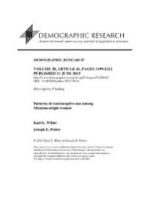
Demographic Research
Navigating the future through demographic research.Demographic Research is a leading journal in the field of demography, published by the prestigious Max Planck Institute for Demographic Research. Available in both print and electronic formats (ISSN: 1435-9871, E-ISSN: 1435-9871), this open-access journal has been a valuable resource for demographers and social scientists since its inception in 1999. With a commendable impact factor and ranked Q1 in its category, the journal demonstrates a significant commitment to advancing our understanding of demographic trends and their implications across contexts. Hailing from Germany, the journal's rich international perspective adds depth to its studies, making it a vital platform for innovative research. Researchers, professionals, and students are encouraged to engage with its wealth of articles that not only document demographic changes but also offer insights critical for policy-making and social planning. The journal's broad scope encompasses diverse themes, providing a comprehensive overview of the demographic shifts that shape societies today.
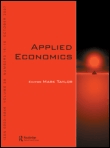
APPLIED ECONOMICS
Illuminating the Path of Applied Economic InquiryApplied Economics, published by Routledge Journals, Taylor & Francis Ltd, is a revered platform in the field of Economics and Econometrics. Since its inception in 1969, the journal has maintained its commitment to disseminating high-quality research, covering a wide range of topics within applied economics that are critical for understanding and addressing real-world economic issues. With a notable Q2 ranking in Economics and Econometrics and a strong standing in the 67th percentile of Scopus rankings, it serves as an essential resource for researchers, professionals, and students alike, providing insights that bridge theoretical frameworks and practical applications. While the journal is not an Open Access platform, it continues to foster academic discourse and innovation within the economics community, contributing to the ongoing development of evidence-based policies and practices. Its accessibility and robust editorial standards ensure that the latest findings and methodologies reach an engaged audience, further solidifying its reputation as a key publication in the field.
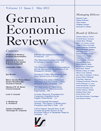
German Economic Review
Connecting Scholars Through Rigorous Economic AnalysisGerman Economic Review is a distinguished academic journal published by WALTER DE GRUYTER GMBH, focusing on diverse aspects of economics and econometrics. With its ISSN 1465-6485 and E-ISSN 1468-0475, the journal serves as a vital platform for disseminating high-quality research from both established scholars and emerging voices in the economic field. Housed in the UK, the journal contributes significantly to the academic community, evidenced by its placement in the Q3 category for Economics and Econometrics in 2023 and its Scopus ranking of #381 out of 716, reflecting its impactful presence in the discipline. German Economic Review does not offer open access options; however, its convergence from 2001 to 2024 indicates a long-standing commitment to advancing economic discourse. This journal is ideal for researchers, professionals, and students eager to engage with contemporary economic theories and applications.

JOURNAL OF POPULATION RESEARCH
Empowering research to inform policy and planning.JOURNAL OF POPULATION RESEARCH, published by Springer, is a premier journal dedicated to advancing the field of demographic studies. With a focus on research that addresses the complexities of population dynamics, this journal serves as a vital platform for scholars, practitioners, and students alike. It holds a commendable Q2 ranking in the Demography category for 2023, underscoring its influence and commitment to quality research. The journal spans a rich convergence of knowledge from 2005 to 2024, covering key developments and emerging trends in population research. Although it operates under a traditional access model, its impact continues to resonate throughout the academic community, highlighting the importance of robust demographic analysis in policy and planning. By fostering insightful discussions and providing access to groundbreaking studies, the JOURNAL OF POPULATION RESEARCH remains an essential resource for those eager to deepen their understanding of population issues.
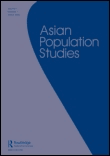
Asian Population Studies
Empowering Scholars with In-depth Demographic InsightsAsian Population Studies is a distinguished journal published by Routledge Journals, Taylor & Francis Ltd, delivering comprehensive insights into the vibrant field of demography. Since its inception in 2006, this peer-reviewed journal has consistently provided a platform for high-quality research that enhances our understanding of population dynamics in Asia. With an impressive category ranking of Q2 in Demography for 2023, and holding a notable position as 35th out of 139 within the Scopus ranking, it is recognized for its significant contributions to the field, appealing to researchers, scholars, and professionals alike. The journal covers a diverse range of topics, including population growth, migration patterns, and socio-economic factors influencing demographic changes across Asian countries. Although it does not offer open access, Asian Population Studies remains a vital resource for those seeking to explore demographic trends and their implications for policy and practice in one of the most populous regions of the world. With a commitment to academic excellence, it continues to serve as an essential tool for anyone engaged in demographic research and study.

Papeles de Poblacion
Connecting diverse perspectives in population dynamics.Papeles de Población, published by the Universidad Autónoma del Estado de México, is a prominent open-access journal that has been advancing the field of demography since its inception in 1997. With an ISSN of 1405-7425, this journal aims to foster a deeper understanding of population studies through research articles, reviews, and critical analyses that address the complex dynamics of demographic changes, social structures, and their implications. While currently ranked in the fourth quartile of its category in 2023, it serves as a significant channel for researchers, professionals, and students to disseminate and access cutting-edge findings. Open access since 2004, it provides a platform for broader readership and knowledge sharing, thus contributing to the global discourse on population issues. Based in Mexico, the journal is committed to embracing diverse perspectives, emphasizing the importance of regional studies within a global context.

ECONOMIST-NETHERLANDS
Connecting Economists Through High-Quality ResearchThe Economist-Netherlands, published by Springer, is a prestigious journal that has been a cornerstone in the field of economics since its inception in 1852. With a strong focus on disseminating high-quality research and insights, this journal serves as an essential resource for economists, researchers, and practitioners interested in the dynamic landscape of economic theory and applications. Currently ranked in the Q3 category in Economics and Econometrics, this journal demonstrates a commitment to scholarly rigor, as reflected in its Scopus ranking within the 55th percentile. The journal features an extensive scope that encompasses key topics relevant to both historical and contemporary economic challenges, fostering a vibrant academic discourse. While access is not open, the journal remains a vital publication for anyone seeking to advance their knowledge in the economic sector. With an enduring legacy, the Economist-Netherlands continues to contribute significantly to the evolution of economic scholarship.
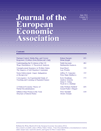
Journal of the European Economic Association
Navigating Complex Economic Challenges with Scholarly RigorThe Journal of the European Economic Association, published by Oxford University Press, stands as a cornerstone in the field of economics, boasting a strong impact factor that reflects its high citation rates and significance among peers. With an impressive Scopus ranking of 12 out of 288 in general economics, encompassing a remarkable 96th percentile, this journal is recognized for its rigorous peer-reviewed research contributions that advance the understanding of economic theory and policy. Dedicated to publishing innovative studies and theoretical advancements since its inception in 2003, it continues to engage scholars worldwide, providing vital insights applicable to both academia and industry. Although it does not follow an open-access model, the journal's extensive reach and commitment to excellence make it an essential resource for researchers, professionals, and students seeking to deepen their understanding of contemporary economic issues. Based in the United States, the journal reflects a European perspective on global economic challenges, making it indispensable for those at the forefront of economic research.